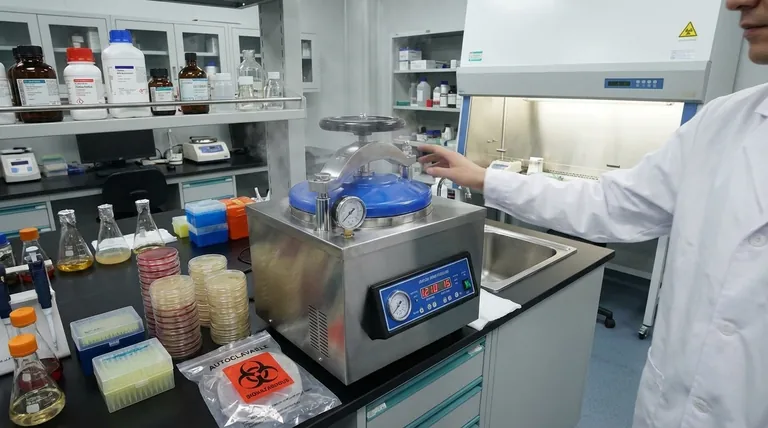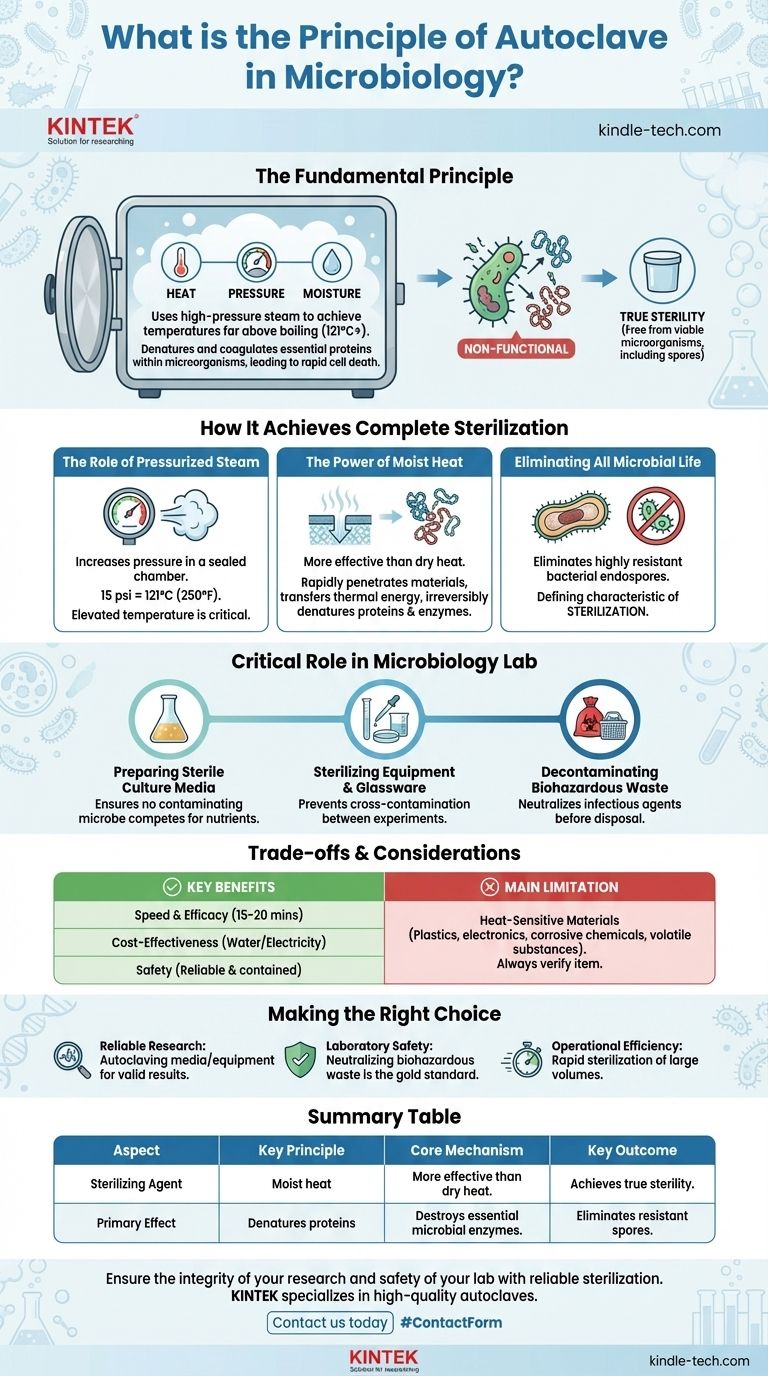The fundamental principle of an autoclave is to use high-pressure steam to achieve temperatures far above the boiling point of water, ensuring the complete destruction of all forms of microbial life, including highly resistant bacterial spores. This process of moist heat sterilization denatures and coagulates essential proteins within microorganisms, rendering them non-functional and leading to rapid cell death.
An autoclave doesn't just use heat; it uses the combined power of heat, pressure, and moisture. This combination allows it to achieve true sterility, a state of being completely free from viable microorganisms, which is an absolute requirement for both safety and accuracy in microbiology.

How an Autoclave Achieves Complete Sterilization
The effectiveness of an autoclave lies in its ability to harness the physical properties of water under pressure. It creates an environment that no microorganism can survive.
The Role of Pressurized Steam
At standard atmospheric pressure, water boils at 100°C (212°F). However, by increasing the pressure inside a sealed chamber, an autoclave raises the boiling point of water.
A typical setting of 15 pounds per square inch (psi) above atmospheric pressure forces water to boil at 121°C (250°F). This elevated temperature is a critical factor in its sterilizing power.
The Power of Moist Heat
Moist heat is significantly more effective at killing microbes than dry heat. The hot, saturated steam rapidly penetrates materials and transfers its thermal energy.
This process irreversibly denatures and coagulates essential proteins and enzymes within microbial cells. Without these functional proteins, the cell's metabolic and structural integrity collapses, resulting in death.
Eliminating All Microbial Life, Including Spores
Many disinfection methods can kill active bacteria and viruses, but few can eliminate bacterial endospores. These are tough, dormant structures produced by certain bacteria that can survive boiling and chemical exposure.
The high-temperature, high-pressure steam environment inside an autoclave is lethal to these spores, which is the defining characteristic of sterilization versus simple disinfection.
The Critical Role of Autoclaves in a Microbiology Lab
In microbiology, preventing unwanted contamination is not just a best practice; it is essential for the validity of the work and the safety of personnel.
Preparing Sterile Culture Media
To grow a specific microorganism, the culture medium (liquid, semi-solid, or solid) must be completely sterile beforehand. Any contaminating microbe would compete for nutrients and invalidate the experimental results.
Sterilizing Equipment and Glassware
Instruments, glassware, pipette tips, and other reusable lab supplies must be sterilized to prevent cross-contamination between different experiments or cultures. This ensures that observations are a direct result of the intended organism.
Decontaminating Biohazardous Waste
After experiments are complete, all cultures, petri dishes, and contaminated materials are considered biohazardous waste. Autoclaving is the primary method used to neutralize these infectious agents before they are safely discarded, protecting both lab workers and the environment.
Understanding the Trade-offs and Considerations
While highly effective, the autoclave is a specific tool with its own set of operational rules and limitations.
Key Benefits: Speed and Efficacy
Autoclaves are remarkably fast, capable of sterilizing a full load of materials in as little as 15-20 minutes (plus heating and cooling time). The penetrating power of steam ensures that even items with complex shapes are thoroughly sterilized.
Cost-Effectiveness and Safety
By relying on water and electricity, autoclaving is a cost-effective method for routine sterilization, eliminating the need for expensive chemical disinfectants. It is a reliable and contained process for making infectious waste safe for disposal.
The Main Limitation: Heat-Sensitive Materials
The primary drawback is that the high heat and pressure will destroy or damage many materials. Heat-sensitive plastics, certain electronic components, corrosive chemicals, and volatile substances are not suitable for autoclaving. Always verify that an item is autoclavable before processing it.
Making the Right Choice for Your Goal
Applying the principle of autoclaving correctly depends on your primary objective in the laboratory.
- If your primary focus is reliable research: Autoclaving culture media and equipment is the non-negotiable standard for preventing contamination and ensuring your experimental results are valid.
- If your primary focus is laboratory safety: Autoclaving biohazardous waste before disposal is the gold standard for neutralizing pathogens and protecting personnel from infectious materials.
- If your primary focus is operational efficiency: The autoclave provides a rapid, reliable, and cost-effective method for sterilizing large volumes of reusable equipment and media.
Mastering the principle of moist heat sterilization is fundamental to maintaining both the integrity of your scientific work and a safe laboratory environment.
Summary Table:
| Aspect | Key Principle |
|---|---|
| Core Mechanism | Uses pressurized steam to achieve temperatures above 121°C (250°F). |
| Sterilizing Agent | Moist heat, which is more effective than dry heat. |
| Primary Effect | Denatures and coagulates essential microbial proteins and enzymes. |
| Key Outcome | Achieves true sterility by eliminating even highly resistant bacterial spores. |
Ensure the integrity of your research and the safety of your lab with reliable sterilization. KINTEK specializes in high-quality autoclaves and lab equipment designed to meet the rigorous demands of microbiology. Our solutions help you achieve complete sterility for culture media, equipment, and biohazardous waste, protecting your work and your team. Contact us today to find the perfect autoclave for your laboratory's needs.
Visual Guide

Related Products
- Laboratory High Pressure Steam Sterilizer Vertical Autoclave for Lab Department
- Desktop Fast High Pressure Laboratory Autoclave Sterilizer 16L 24L for Lab Use
- Portable Digital Display Automatic Laboratory Sterilizer Lab Autoclave for Sterilization Pressure
- Portable High Pressure Laboratory Autoclave Steam Sterilizer for Lab Use
- Desktop Fast Laboratory Autoclave Sterilizer 35L 50L 90L for Lab Use
People Also Ask
- What are the advantages of using an autoclave equipped with a stirring device for molten salt testing? Dynamic Accuracy
- What are the standard operating parameters for an autoclave? Master Temperature, Pressure, and Time for Sterilization
- What is the life expectancy of an autoclave machine? Maximize Your Investment with Proper Care
- What is the primary function and principle of autoclaving? Master Lab Sterilization with High-Pressure Steam
- What critical environmental conditions does a laboratory autoclave provide for evaluating wear resistance? - KINTEK



















